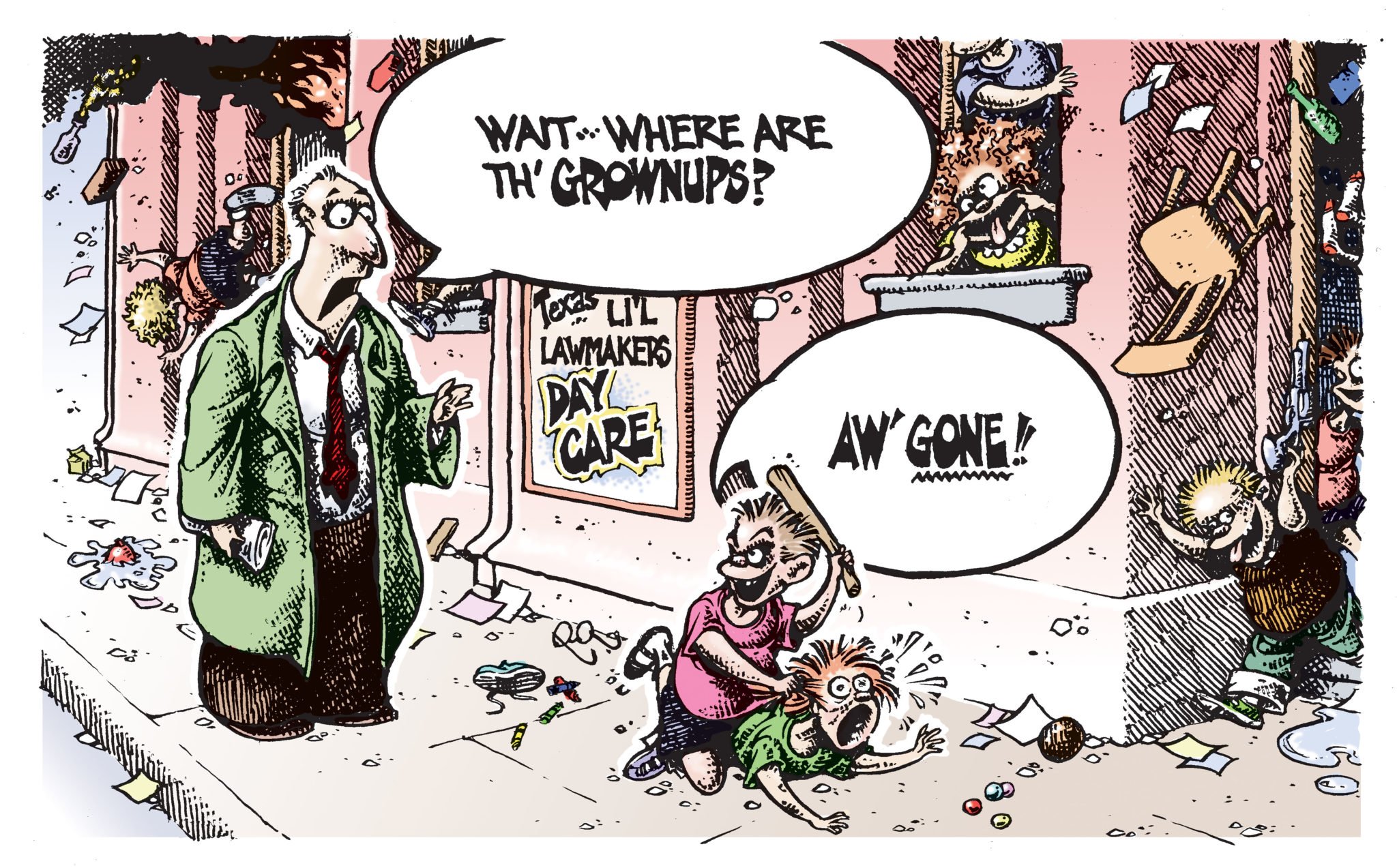
One Last Kick in the Nuts: On Joe Straus’ Republican Censure

“If you want to build a ship, don’t drum up men to gather wood, divide work and to give orders,” said Amy Clark, vice chair of the Republican Party of Texas, at a meeting of party leadership on Saturday. “If you want to build a ship, instead teach people to long for the endless immensity of the sea.”
A strange time we live in, when the wisdom of Frenchmen — Antoine de Saint-Exupéry, in this case — closes out important conclaves of the nation’s most important state GOP. And a little grandiose, perhaps, given that Clark was speaking to a bland meeting of the State Republican Executive Committee, in an aggressively beige room at a Wyndham Garden hotel in Austin.
But there’s something to that sentiment. People — particularly in politics, and particularly the young — join causes that offer exciting new possibilities, rather than an incrementally better present. And it’s in that light, perhaps, that the moment in political time represented by the committee’s main order of business, the censure of outgoing House Speaker Joe Straus, ought be considered.
First, it’s worth noting how weird the censure is. Straus is by any measure one of the most important Texas Republicans ever. Tied for the longest-serving speaker in Texas history, during his tenure he delivered a lot of policy gains to important Republican constituencies, and he’s voluntarily retiring. Anywhere else, one would think, he’d be getting a lot of pats on the back and some stretch of highway named after him, no matter how much his rivals within the party hated it.
Instead, the party he’s spent his life working for kicked him in the nuts on his way out the door. It would be one thing if the committee members alone did this, because they are famously a wacky bunch, and at times have included bona fide white nationalists. But both Clark and Texas GOP Chairman James Dickey voted for the censure too, giving Straus’ new status as an un-person the party’s official stamp. Doesn’t get much clearer than that.
The censure allows the groups that flushed millions of dollars down the toilet trying to unseat Straus to claim they ran him out of town on a rail, though of course they’d claim that anyway. More important, as Quorum Report’s Scott Braddock writes, it’s a pre-emptive dig at any Republican who’d accept money or help from Straus after he retires.
Straus has promised to spend his war chest to protect his friends and allies. He also now has the chance — the freedom, in a sense — to speak his mind about figures like Dan Patrick, who was born to manipulate the media. Straus believes he was hamstrung from doing just that as speaker, and hopes to help fill that role. The party is saying, in turn, that Straus is absolutely not the future, that he’s barely the present anymore, and that the direction of Texas Republicanism is elsewhere. Who’s right?
The most important metric to consider, I think, is how new Republicans are getting made right now. Straus himself is part of a Republican generation that was carefully organized and encouraged at a time when the Texas GOP had very little power and needed to win over conservative Democrats. That cohort, which included Straus and Harris County Judge Ed Emmett and former Senator Kay Bailey Hutchison, carried a specific set of conservative values with them into office. But they’re now a dying breed. Most have left public office or will do so in the not-too-distant future.
The Republican brand has a problem, one that’s almost cliché to point out. No one under the age of about 40 has lived under a national Republican government that has produced anything other than war, economic disaster, authoritarianism and the tyranny of the cultural values of the old. Just about everything since the early ’90s has helped push young people away from the party. But the interesting question here isn’t how young people vote, but how the young people who remain with the party vote.
Ask yourself: What kind of young person wants to be associated with a young Republican organization — say, the influential Young Conservatives of Texas, which once tried to hold a mock immigration sting on UT campus — at this moment? One answer: Someone who thrills to, or at least accepts as the cost of doing business, the president’s authoritarian tendencies, sexism, racism, corruption and love of bludgeoning the opposition. In this state, it also means someone who feels the same about Dan Patrick, Ken Paxton, Greg Abbott and the lot.

Those are the people who will soon be serving in the Legislature and running state agencies — that’s the way it works. By that time, they may have left their Pepes behind, or they may not, but all evidence suggests that adults maintain the general ideological affiliations they developed when young.
There are, of course, still young Republicans who don’t like Trump, who don’t hate Straus, and adhere generally to the old Chamber of Commerce model. But the party is telling them, over and over again, that the future is not with them. That the opportunities and power they’ll have going forward will be limited. And the organizations that can boost them up and tie them together are weaker than those that do the same for the other side.
The big idea, the “endless immensity of the sea” that drives the Republican Party of Texas now, is Anglo nationalism and suburban ressentiment (there’s the French in Texas politics again). It’s a lot to ask Straus to fix that — most of the battles he and others like Emmett are fighting are rear-guard actions, to bolster their line of defense but not to advance. There’s no real effort to put pro-business types in the Senate, for example, or challenge statewide elected officials like the criminally indicted Ken Paxton. The other side is too dug-in, and they’re getting more troops every year.
The ideological moorings of the party are changing so fast it’s difficult to keep track. One of the most powerful interest groups in the state is the Texas Association of Business. Just a few years ago, the big business group would essentially present a laundry list of items to the Legislature and Republican lawmakers would give their stamp of approval. Now, the Texas Association of Business is toxic, because conservatives see business groups as the enemy.
Recently, the group endorsed Angela Paxton, Ken Paxton’s wife and a candidate in Senate District 8’s open primary. Paxton essentially rejected the endorsement, and accused her opponent, Phillip Huffines, of the crime of having sought it for himself, adding she had done nothing whatsoever to earn it. Huffines, in turn, called the Texas Association of Business a stalwart supporter of “radical leftists” and “deeply out of step with Texas Republicans.” The party is through the looking glass. One committee member who voted against the censure this weekend told the Texas Tribune after the vote that “the Republican Party of Texas has changed into something most mainstream Republicans would not recognize.” It’s always difficult to come to terms with the fact that you’re the one who’s out of step.
“My heart’s desire is to unify this party,” Clark said, in her speech to the executive committee, minutes after the censure vote had concluded. But it has unified, mostly. Those remaining are holdouts, like Crusaders who refuse to leave the Holy Land. The moral challenge for Republicans who refuse to accept Anglo nationalism as a general principle is to leave the party or to come up with a different mode, a better big idea, and no one’s come close yet. Whatever comes next has to be new. The older incarnation of dollar-first Republicanism isn’t coming back — that ship has sailed.


